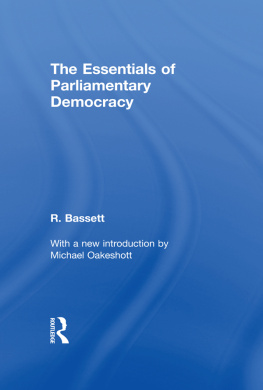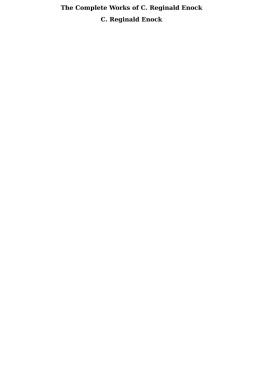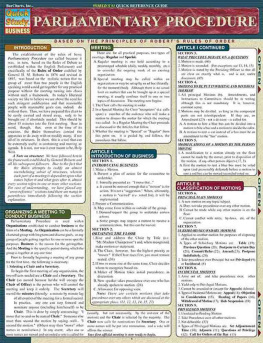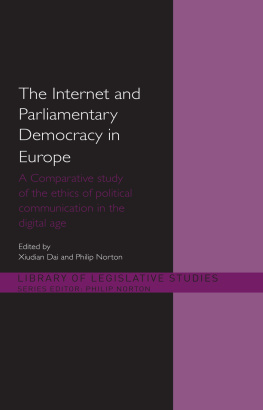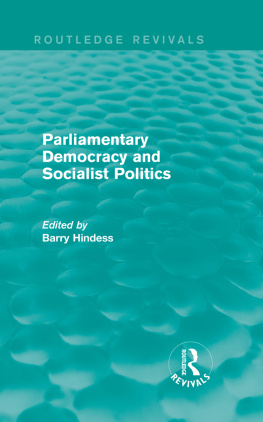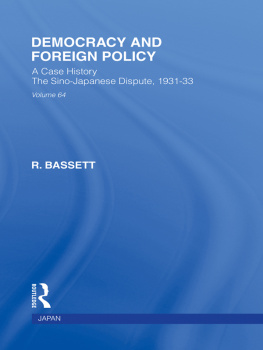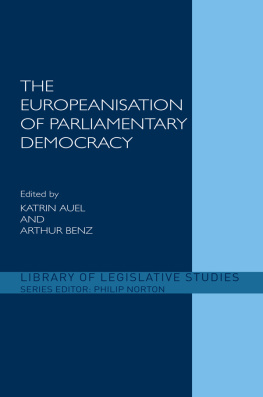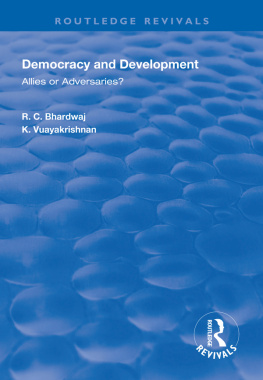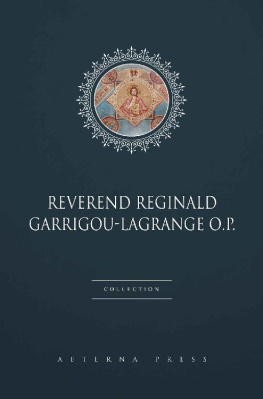First published in 1935 by Macmillan & Co. Ltd.
This edition published 2013 by Routledge
2 Park Square, Milton Park, Abingdon, Oxon OX14 4RN
711 Third Avenue, New York, NY 10017
Routledge is an imprint of the Taylor & Francis Group, an informa business
First Edition 1935
Second Edition (Reset and revised) 1964.
THIS book has been provoked by recent tendencies in British politics and by current controversies relative to the present working and future prospects of our system of parliamentary government. Its object is to elucidate or to re-state the conditions essential to the maintenance of parliamentary democracy. I have sought to explain what parliamentary democracy involves rather than to defend it, because I am convinced that the dangers with which it is threatened, in this country especially, arise more from failure to understand the necessary conditions of its survival than from any form of direct attack.
In concentrating my attention upon British political life and institutions, I have not been indifferent to the fate of parliamentary democracy in other countries. On the contrary, I believe that the future of democracy throughout the world depends in large measure upon the preservation and improvement of the British system of government. Moreover, our long and successful application of democratic methods suggests that an analysis of the British situation is most likely to bring out the essentials of parliamentary democracy.
The analysis attempted in the following pages may be justified on several grounds. To some minds, British political institutions are already in grave peril. I do not share that view, but it is none the less desirable to be on guard against complacency. Elements of danger have always existed, and in recent years new ones have emerged.
In the first place, it is difficult to resist the conclusion that there is a widespread lack of understanding, not only of our own political system, but also of the nature and conditions of political action as such. The very continuity and apparent stability of our political institutions have engendered a certain indifference to them, not unmingled with a measure of that contempt which familiarity often breeds. We are apt to take them for granted; we grumble at them, as is our habit; and we should probably rally to their defence if they were seriously attacked. Familiarity, however, is not the same thing as understanding; indifference, contempt, and unrestrained indulgence in the tendency we have to grumble, may all in their several ways weaken that which it is desired to preserve; and the instinctive rally against serious challenge is a poor substitute for the political intelligence which would obviate its necessity. It is this inadequate comprehension of the working of our political system which is responsible for excessive demands upon it, and for the resulting disillusionment. Too many people do not sufficiently understand either the nature of the British politicians work or the conditions under which he pursues his activities. They fail to penetrate beneath the superficialities of political life, and an atmosphere is created which is favourable to the growth of scepticism and cynicism.
In the second place, the extension of the functions of the State has given rise to real difficulties for all political systems, and to genuine doubts of the efficacy of existing political machinery and methods. Such doubts have been strengthened by the apparent inability of governments to cope with the manifold and complex problems of the post-war world. The political system, in this country as elsewhere, has been included in a general criticism of established institutions, fostered by economic distress. It has been held responsible for the failure to apply the so-called solutions which have found favour from time to time, numerous and incompatible though they have been. Since the coming of the world depression, especially, a demand has arisen for action as suchfor getting something done, no matter whatand our political methods have been criticised as the main obstacle to its satisfaction. Other factors have been operative. Russian Communism may have few admirers here, but many who disapprove of its motives have a certain sympathy with some of its methods. The same is true of Italian Fascism; and many of those repelled by the one have been attracted by the other. However objectionable the incidentals may be, the spectacle of one group or party imposing its will ruthlessly upon the rest evokes a sympathetic response in the most diverse quarters. Both movements have given an impression of vigour, efficiency, and determination, qualities seemingly lacking under parliamentary regimes. They have a dramatic appeal which the latter do not possess and can never hope to acquire. The rise of other dictatorships has seemed to justify their derision of democratic principles and to confirm the view that there is a general movement away from parliamentary methods of government. These events abroad have exercised a two-fold influence. A tendency to worship at strange shrines has emerged; while the mood of pessimism about parliamentary institutions has deepened and feelings of alarm have been aroused. The growing volume of criticism; the clamour for some way out of economic distress and party confusion; the loss of confidence; all constitute additional elements of danger.
The absence of any direct challenge of importance should not blind us to the fact that there are other dangerous factors. He goes furthest who knows not where he is going, Cromwell is alleged to have said. A quite genuine avowal of support for our political institutions may be combined with renunciation of the methods upon which they rest. A sincere belief in democracy may be accompanied by actions which strike at its very foundations. The last few years have witnessed a marked tendency to advocate policies and programmes which have no regard to the possible consequences upon our political system. Determination to achieve particular ends has led to a growing indifference to means. When prominent spokesmen of an important political party declare their intention to carry out a revolutionary policy by constitutional methods, it is certainly time to consider seriously whether or not that is possible, and what the effects of any attempt to carry out that intention are likely to be. In such circumstances, no further apology for this book need be advanced.
Doubtless there are many defects both in the form and the functioning of the British system of government. That is only to be expected, for men made it and men work it. But, however numerous and important the defects may be, it is of the first importance to preserve a sense of proportion. Dr. G. P. Gooch recently made a timely plea for a reasonable relativity in these matters, and Professor Herbert Kraus has reminded us that, No State form and no State constitution is absolutely ideal for a community of people. The criterion must always be whether under the existing circumstances it is comparatively the most agreeable and comparatively the best constitution, under which the people can live. Moreover, the comparatively best constitution in the circumstances is operated by fallible human beings.


